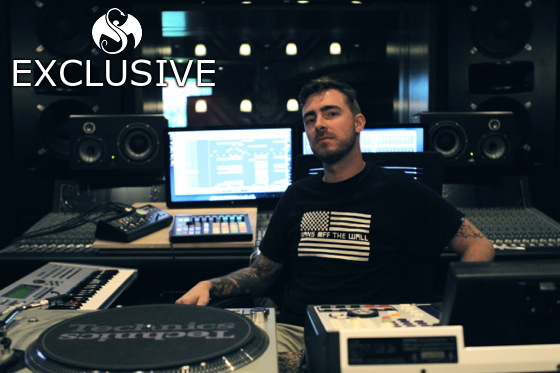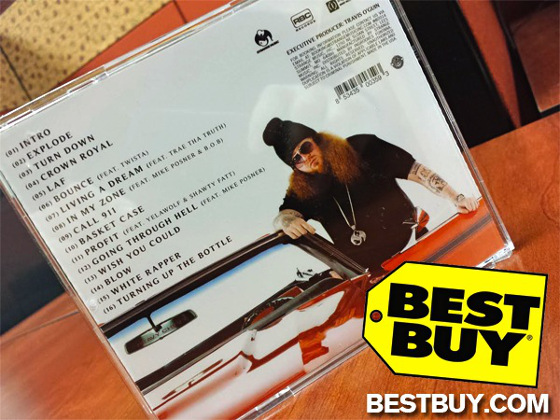Seven Breaks Down His Production On Rittz’s ‘Next To Nothing’ [SM Exclusive]
Aug 29 2014
Seven’s the type of producer that draws more attention when his name isn’t in the booklet of a Strange Music release. Case in point: Rittz’s debut Strange Music album The Life And Times Of Jonny Valiant. Because of time and circumstances, Strange Music’s super-producer never had the chance to get anything on Rittz’s hugely successful project. Now, with time on his side, Seven was able to use his incredible talents to help make Rittz’s upcoming new album Next To Nothing his best project yet.
You may remember Rittz praising Seven’s production on the new album, saying that it set the tone for the entire record. We talked to the producer to find out what happened with Jonny Valiant, how he influenced the sound of Next To Nothing and in the process got some invaluable production insight that all beatsmiths should definitely take note of.
Tell us about your history with Rittz. As I understand you wanted to get on The Life And Times Of Jonny Valiant but because of work and time constraints that wasn’t able to happen.
Yeah when he was working on Jonny Valiant I think it was a situation where I was just working on other stuff at the time. I really, really wanted to work on that album. It was a thing where I kept being like “Yeah, I’m going to get some stuff in. I’m going to get some stuff in,” but I just didn’t get to because of other things that I was doing and before you know it he had the album done. It was just finished. I think that I might have sent things right at the ending but he was done with the album.
That was last year when Strange released like ten albums in a year or something crazy like that.
That was the big year when we put one out like every month. I was working on so much at that time.
This time around you get a shot, what made you want to work with Rittz so much anyway?
Rittz is super dope. I loved the first album. I was up on Rittz on his mixtapes and White Jesus and everything. I kind of followed him since the blogs and everything. I can remember having conversations with the label before we signed him about what I thought about him and if it was someone I’d want to work with – all that kind of stuff – and I was like “Absolutely.”
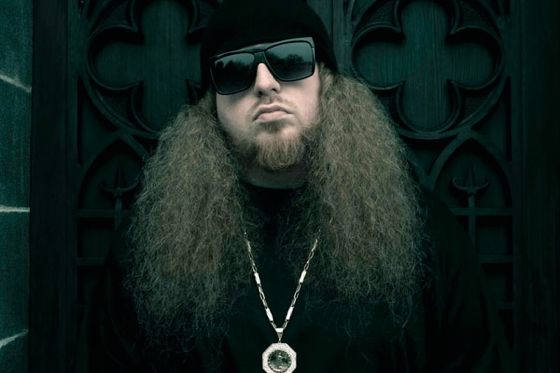
I thought he’d be perfect for the label so I was all about it and then when he started working on that first album, like I said I was kind of upset that so much was going on and I couldn’t work on it. So the second time around I was like immediately…I think I was one of the first producers to submit anything to him. As soon as they gave me the thumbs up to start working on stuff for him I did.
So what do you think of him as an artist?
I think he’s crazy unique which is one of the reasons that he works on Strange really well. This is just a perfect fit for him because everybody on this label is so unique. He’s super dope. He’s just one of these dudes that I can tell has been doing it for a really long time. Even though I picked up on him from the blog world and a lot of those dudes are guys who just now started doing it or whatever, Rittz is just someone who I can just tell has been doing it his whole life and I just happened to tune into him through that world. I just immediately respect him because I can tell that he’s a real emcee. He’s rooted in this. I really, really respect that and he’s just really, really good at what he does and different and doesn’t sound like anyone.
So when you think about producing for Rittz, what are you looking to do?
A couple of things. For me when I first started about what I wanted to do on the second album it’s kind of like…everything that Rittz does has this sort of throwback feel, you know? To me. He does it in a really, really dope way though. It’s not like throwback, I just don’t know what word to use, but it feels like Outkast and Atlanta and the 90s. That’s kind of what he does, so I wanted to take that sound but just make it more current. I wanted to bring it more current and make it more of what my sound would be but mixed with more of those elements.
I had already thought since the first album that whenever the second album comes around I’m immediately going to jump into that. I love that whole vibe. That’s what I grew up on and I got to do a lot of the bluesy guitars and things I like to do. It’s kind of weird too because if you listen to Rittz to me there’s indie elements going on with his music too. I hear it all over the place with some of the guitars with all the verb and stuff that he did on his mixtapes that’s super indie inspired in ways. I’m all about that so I used a lot of those elements in the beats that I did on the album for him, like “Crown Royal”. I think that was the first beat that I made for him for this album and I just started with that guitar. The whole riff was like just real, like The xx, that group or whatever, that high reverb but minimalist. I just came up with that guitar part and then built everything else around that. I kind of approached it from an indie standpoint and then added other elements to it.
He said that beat set the tone for a lot of what happened on that album. He also said you were able to dial into his sound really well. It’s one of those things that as a fan of your work and someone who’s listened to what you’ve done, it’s surprising to hear you be able to do these things just because we haven’t heard it, but not surprising because we know you can go all over the place. Do you think you’re still underestimated for your versatility?
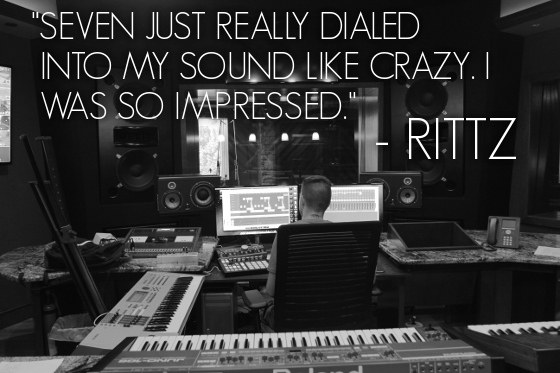
The stuff I did for Rittz wasn’t a new thing. A lot of these things, like the synths I was using and the synth bass and all that stuff, I did all that in the 90s also. It’s hard to trace back what I’ve done through my whole career because a lot of it was local and on a local level before [Tech N9ne’s] Everready and everything. I definitely did music then but it was just with local artists.
I guess in a way with what I did with Rittz was kind of sort of reminiscent of what I did back then in ways. I was like “Oh man I’ve wanted to use some of these synths and these sounds and these drum patterns for a long time now but I haven’t really had the platform for it,” and now Rittz comes along and it’s like the perfect opportunity to kind of get back to that. It was all very familiar to me and I guess nobody’s heard me do it before because no one sounds like Rittz on Strange.
You used to produce Bay Area-sounding stuff way back in the day though didn’t you?
Well that’s what I came up on. When I was a kid I wanted all my beats to sound like E40, and JT The Bigga Figga…The Click. That’s all I listened to. Those albums were what made me want to produce hip hop in a way because I didn’t understand sampling. At the time I was so young so when I heard some of those Bay Area records, Too $hort and E40 I was like “Oh man, this is a whole ‘nother side to rap. I can make this on a workstation. I don’t have to have samplers and have to understand sampling and know how all that works,” because I definitely didn’t get that when I was 12 and 13. I had a workstation when I was really young so I could make that sound and it was really melodic and that’s what I loved about it. That’s kind of where I came from.
So to a lot of us we have no idea that this is your roots.
Yeah it absolutely is. I learned sampling and more grimier production that wasn’t just clean and melodic, like I learned that down the line and later on.
One track that stood out in this regard was “Living A Dream”. It’s absent of a lot of the trademarks that fans who know you through Strange have come to know you by. It’s very sparse, clean and melodic and everything’s live. How did this track come about?
That track is actually a song that had a sample in it originally. It was something that he had and it had a sample in it. I mean it’s a really interesting story because that was sort of a track that he did that was done but had a sample in it that we couldn’t clear. The sample was super dope. I took it and they asked me if I would work on the song without the sample and I told them “I can but the beat’s going to have to change. It can’t be the way it was originally.” Sometimes that can be hit or miss with an artist, when they’re really married to something they’ve been listening to a lot.
The song was already really, really dope. I didn’t want them to get rid of it just because of the sample so I got with a guitarist, Lucas, who I’ve been working with on a bunch of stuff lately and had him come in and listen to it. We kind of sat down and listened to it and worked on it for a whole day and did out a bunch of different parts for it and figured out how we could change the chord progression and how we could change the structure of how the chords are moving. The big deal was the vocals on the hook. I can kind of do anything on the verses but the hook had to still sound awesome over the beat I make.
I remember we worked on the song all day long and I was listening back to it after we worked on it all day. We put down the guitar parts and the bass guitar parts. I had already programmed some drums and had added some actual live drums that were recorded before that ended up working for the song. We listened back at the end of the day and I was like “This isn’t it. We have to throw it all away and start over again.” (Laughs) So we did and everybody was like “What? Why did we do this?” It was just one of those moments where I was like “No, this isn’t it. We have to start over. Start over completely from scratch on it.”
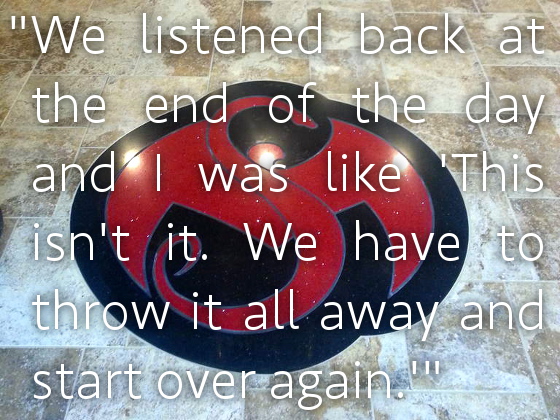
We redid the whole thing because I knew that that wasn’t it. I knew that it was in ways too close to the original and in other ways it didn’t feel right. There was a whole bunch of stuff going on. I didn’t want it to be close to the original. I wanted it to be different so we redid it until I knew it was right and then we got it right and I knew it was right and I sent it to Rittz and at first he was like, he had to sit with it and get used to it. The he hit me a day later and was like “Okay, I love it now.” He’s like “I just had to get used to it being so different or whatever.” So that’s the story of “Living A Dream”.
So when you went over it a second time, did it take just as long as the first time?
It came a little more naturally because we were in the pocket already. A big part of that song was, you know when you’re trying to capture the essence of a sample it’s not so much what you’re playing but it’s how you’re playing it. I’ve come to find that you can kind of play anything, but the way that it’s played is what makes it feel like the sample.
A lot of people get hung up on thinking that “Well it’s these chords” or “It’s this melody” or whatever is what needs to be the same when you’re trying to remake a sample. They think that that’s what makes the song great – and it’s a big part of it but everybody overlooks the feel, the way that it’s played. The little quirks that have to do with the swing and everything. The live feel of it. Where things are placed at rhythmically. Whenever I approach something like that I try not to worry so much about the sample’s doing melodically, the chords that are being played and all that, I pay way more attention to what’s happening rhythmically. Because if I can get something that’s the same rhythm, the same vibe there then I know we can work with it, but without that it’s just never going to feel the same.
It has to have that same pocket but that’s really hard to do because that comes from a player’s signature style. Anybody can play an awesome chord progression but honing in on a guitarist’s personal style of playing, that’s really hard to do. That’s kind of what took a lot of the time was sitting down and being like “That doesn’t feel exactly like that style. Whatever is going on there.” The whole record has this whole kind of funk/soul type of vibe to it and that can be hard to capture. Once we got it then the second time around it was just a matter of changing the chords and changing the way that things were working melodically.
In this case a lot of props goes to the player and on you for interpreting whether or not it was fitting the vibe.
I mean yeah it was a lot of Lucas just playing and playing and playing and me being “That’s not it, try something different. That’s not it, try something different,” until finally I was like “That’s it.”
Tell me about the other two beats you made. One was “Crown Royal”, and as I understand that one came first and Rittz requested a certain sound from you with certain elements and that’s what came out of it.
Well yeah I think that the thing that he mentioned was the synth bass. He was like “I want to use a lot of the synth bass” and I was like “That’s already what I was thinking.” I was already there with the synth bass. I already knew I was going to use that on tracks or whatever. He said he wanted it to be “laid back” too and wanted the whole album to have this vibe. So I was like “Cool,” and that was the first one I started with.
Like I said I just kind of sat down with the guitar and played something that I would play if…like anytime I play anything on guitar it’s something that sounds super indie, probably because I’m a shitty guitar player. It’s kind of like, in that style you don’t have to be an amazing guitarist – and I love that, so I just sat down and worked out those parts with the guitar and just got in the zone and just took it there and added the synth bass next and just built everything and did the drums last.
There’s a lot of producers who are very drums first but you’re not like that.
No, I’m always drums last because…drums are very important but I don’t know if the track’s going to work until all the other stuff is there because I can make the drums work. I never worry about the drums. I can always make the drums work. I’ve never not used a track because of the drums…ever. It’s always because the everything else, the marriage of all the other stuff going on melodically. I always do that stuff and kind of listen and come to a point where I know it’s going to work and go “Oh man…that’s dope.” And then sometimes it doesn’t so I don’t finish it so I probably have a ton of beats that are just all this melodic stuff going on with no drums because I don’t do the drums unless I know it’s going to work.
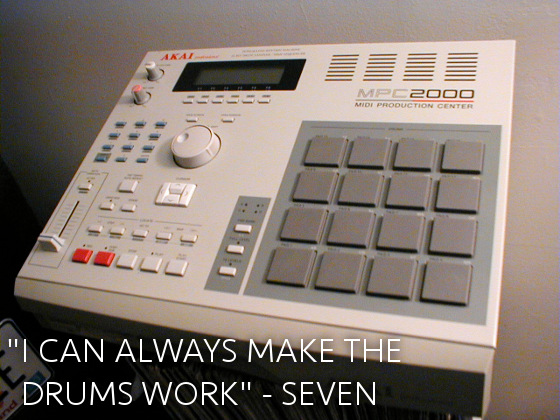
There’s one more beat, tell me about “Wish You Could” and how that came about.
We kind of reached a point in the album where we did a lot more laid-back tracks or whatever and he wanted to do some hard shit so I just started putting together a few. To me that has that grimy, hard vibe and it’s at a tempo that feels really good for him. It just has those elements you know? I just imagined it being something he could perform.
Your kicks have a lot of punch to them. How do you go about developing a lot of those sounds?
I have a very particular 808 that I’ve created over the years. I always use the same 808 on shit but it’s kind of one that’s been in development for so long. One day – it was actually when we did “He’s a Mental Giant” – I was like “that’s it.” I just tweaked it a little bit more and made it a little bit more smooth and now I have that 808. It’s the 808 that I use on everything. What I do is use that 808 but then I place a different kick on top of it for attack. It kind of just depends on the vibe of the song and what it is for what kind of kick I’m going to place on top of it. I just layer the two together.
On a track like this one it called for something very very punchy and short and not a lot of low end but just something to kind of give it that really harsh attack to it, because the song is more about the 8o8s than anything. So yeah I get the 808s going and then I match up the pattern with the 8o8s with the kicks that I want to layer it with for attack. Then I normally take the low end out of the punchy kick to give it whatever it needs to feel punchy and then really beef up the 808 even more.
It definitely works. How does it feel to be on this record?
Awesome man. I’ve been wanting to be a part of Rittz’s projects now for a long time. When the first album came out and I wasn’t able to be on it I was just kicking myself so much for that. I wish I could’ve been involved with Jonny Valiant but you know, it just wasn’t the right time. I’m just really glad that I could be a part of the second album which I think turned out super, super, super dope.
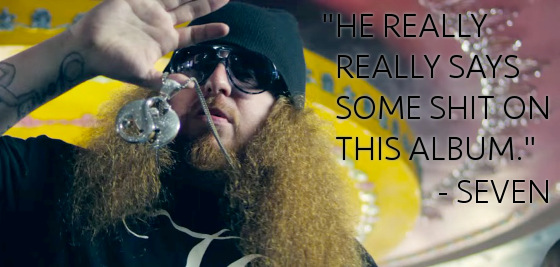
I was about to ask, how do you like how the songs came out that you guys worked on?
I love them. I mean everything that he did to the songs, even the bonus songs, everything. I think that the bonus song “Ride It Out” [available with the Next To Nothing pre-order on strangemusicinc.net] was the first one that he put out. That one, I heard that one first before I even heard the master of the album and I was just like “Shit…” I love that song. He killed it and everything he did with the other tracks is perfect.
What can fans expect from this record?
This album says a lot. The album is very well rounded. It’s a very complete album. The stuff that he talks about on this album, his writing and everything, I feel like it’s on a different level on this album. He’s always a great writer or whatever but he really, really says some shit on this album. It’s just an album that I think a lot of people can connect with for sure. It’s very, very very relatable. I think that’s something that Rittz does best is just make songs that people can relate to. He specializes in that for sure and he definitely does that with this album.
Anything you want to say before we get out of here?
I just hope that nobody sleeps on this album. I don’t think that anyone will I just want to see this album reach as far as it can because it definitely deserves it.
CLICK HERE TO PRE-ORDER
NEXT TO NOTHING FROM BEST BUY
-
What are you expecting to hear from Seven on Next To Nothing?
Leave your thoughts in the comments section below!
